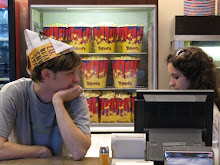 If you've ever had the displeasure of chitchatting with me about favorite films, I've undoubtedly mentioned "O Lucky Man!" (1973), a Lindsay Anderson film starring Malcolm McDowell ("A Clockwork Orange," 1971). It is far and away my favorite.
If you've ever had the displeasure of chitchatting with me about favorite films, I've undoubtedly mentioned "O Lucky Man!" (1973), a Lindsay Anderson film starring Malcolm McDowell ("A Clockwork Orange," 1971). It is far and away my favorite.(And I'm thoroughly suspicious of anyone who can't name a single favorite film. You have one, but you just like being enigmatic.)
At long last, the three-hour masterpiece (and I don't use that term lightly) is on DVD. My copy of “O Lucky Man!” shipped yesterday from Amazon.com.
I've been waiting to get this “O Lucky Man!” DVD since my parents bought the double VHS set in the mid-1990s. I stole that copy, and I think the tape is about to break.
"O Lucky Man!" is part two of a Anderson-McDowell rebellion trilogy, where all three protagonists played by McDowell are named Mick Travis. The characters, in my view, are loosely related. They don't share the same histories, apparently, but they are all connected through acts of rebellion.
Part one is "If...." (1968), a story about students revolting against an authoritarian administration. The boys ultimately terrorize the campus of the British Boys School. If you're going to study violence and the moving image, you best start with this one and work your way back through the gangster films of the 1930s. The film has worn very well and resonates powerfully in an era when school shootings are getting more and more puzzling.
Part three is "Britannia Hospital" (1982), a messy film where Mick Travis is an investigative reporter. He secretly tries to document horrific human experiments at a state hospital just as the Queen Mother is set to make her visit. Watch this film last, because it's disappointing compared to the others.
Part two, however, is a brilliant, mysterious work. "O Lucky Man!" is best described as an absurdist satire about a coffee salesman who sets out to conquer his sales district. He discovers a speakeasy and strippers at a grand first-class hotel. A freakish experiment at a hospital. And all sorts of surprises you won’t believe. His salesman credo prevents him from seeing clearly the "world outside," which crumbles more and more as he roams farther away from a life schlepping java.
Alan Price’s score, for which he sings "live" musical interludes, is one of the most perceptive bits of social commentary you'll ever hear in cinema.
These three films typify the free, rebellious tone of art house cinema that gained currency while American studios were struggling to regain dominance. I desperately wish there were more films like them. They are worthy of cult status, partly because their narrative and moral ambiguities reward repeat viewing.
A word of caution. If you didn't get "A Clockwork Orange," or if you view screen ultra-violence as deplorable in any form – cerebral or sensational – don’t bother with this trilogy. You'll hate me for ever mentioning it.
But if you like movies with satirical bite, queue up your Netflix now.










2 comments:
Just in case anyone is wondering, Alex is not kidding. I can't recall a time when we have talked film and he has not bemoaned the absence of "O, Lucky Man!" on DVD. Finally, he's gotten it. Now he has to let me borrow it!
I'll be hosting a living room screening as soon as Malcolm McDowell accepts my invitation to introduce it.
When the details are confirmed, I'll send you an invite. Please RSVP. To cover expenses, tickets will be $1,342 each. Cash or charge, sir?
Post a Comment